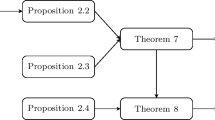Abstract
We study the problem of how well a typical multivariate polynomial can be approximated by lower-degree polynomials over \({\mathbb F}\) . We prove that almost all degree d polynomials have only an exponentially small correlation with all polynomials of degree at most d − 1, for all degrees d up to Θ(n). That is, a random degree d polynomial does not admit a good approximation of lower degree. In order to prove this, we prove far tail estimates on the distribution of the bias of a random low-degree polynomial. Recently, several results regarding the weight distribution of Reed–Muller codes were obtained. Our results can be interpreted as a new large deviation bound on the weight distribution of Reed–Muller codes.
Similar content being viewed by others
References
Alon N. (1983) On the density of sets of vectors. Discrete Mathematics 46: 199–202
N. Alon, I. Ben-Eliezer & M. Krivelevich (2008). Small sample spaces cannot fool low degree polynomials. In Proceedings of the 12th International Workshop on Randomization and Computation (RANDOM), 266–275.
Babai L., Nisan N., Szegedy M. (1992) Multiparty protocols, pseudorandom generators for logspace and time-space trade-offs. Journal of Computer and System Sciences 45(2): 204–232
E. Ben-Sasson & S. Kopparty (2009). Affine dispersers from subspace polynomials. In Proceedings of the 41st Annual ACM Symposium on Theory of Computing (STOC), 65–74.
G. Cohen, I. Honkala, S. Litsyn & A. Lobstein (1997). Covering Codes. North–Holland.
Frankl P. (1983) On the trace of finite sets. Journal of Combinatorial Theory, Series A 34(1): 41–45
P. Gopalan, A.R. Klivans & D. Zuckerman (2008). List-decoding Reed–Muller codes over small fields. In Proceedings of the 40th Annual ACM Symposium on Theory of Computing (STOC), 265–274.
Gowers W.T. (2001) A new proof of Szemerédi’s theorem. Geometric and Functional Analysis 11(3): 465–588
B. Green & T. Tao (2007). The distribution of polynomials over finite fields, with applications to the Gowers Norm. Submitted.
S. Jukna (2001). Extremal Combinatorics with Applications in Computer Science. Springer–Verlag.
Kasami T., Tokura N. (1970) On the weight structure of Reed–Muller codes. IEEE Transactions on Information Theory 16(6): 752–759
Kasami T., Tokura N., Azumi S. (1976) On the weight enumeration of weights less than 2.5d of Reed–Muller codes. Information and Control 30(4): 380–395
T. Kaufman & S. Lovett (2008). Average case to worst case reduction for polynomials. In Proceedings of the 49th Annual IEEE Symposium on Foundations of Computer Science (FOCS), 166–175.
T. Kaufman & S. Lovett (2010). Weight distribution and list-decoding size of Reed–Muller codes. In Proceedings of the 1st Symposium on Innovations in Computer Science (ICS).
Keevash P., Sudakov B. (2005) Set systems with restricted cross-intersections and the minimum rank of inclusion matrices. SIAM Journal of Discrete Mathematics 18(4): 713–727
J. MacWilliams & N.J. Sloane (1977). The Theory of Error Correcting Codes. North–Holland.
Nisan N., Wigderson A. (1994) Hardness vs. randomness. Journal of Computer and System Sciences 49(22): 149–167
A. Razborov (1987). Lower bounds on the size of bounded depth circuits over a complete basis with logical addition. Mathematical Notes 41(4), 333–338. Translated from Matematicheskie Zametki 41(4), 598–607.
R. Smolensky (1987). Algebraic methods in the theory of lower bounds for Boolean circuit complexity. In proceedings of the 19th Annual ACM Symposium on the Theory of Computation (STOC), 77–82.
Viola E. (2008) Correlation bounds for polynomials over {0,1}. SIGACT News 40(1): 27–44
E. Viola & A. Wigderson (2007). Norms, XOR lemmas, and lower bounds for GF(2) polynomials and multiparty protocols. In Proceedings of the 22nd IEEE Conference on Computational Complexity (CCC), 141–154.
Author information
Authors and Affiliations
Corresponding author
Rights and permissions
About this article
Cite this article
Ben-Eliezer, I., Hod, R. & Lovett, S. Random low-degree polynomials are hard to approximate. comput. complex. 21, 63–81 (2012). https://doi.org/10.1007/s00037-011-0020-6
Received:
Published:
Issue Date:
DOI: https://doi.org/10.1007/s00037-011-0020-6



